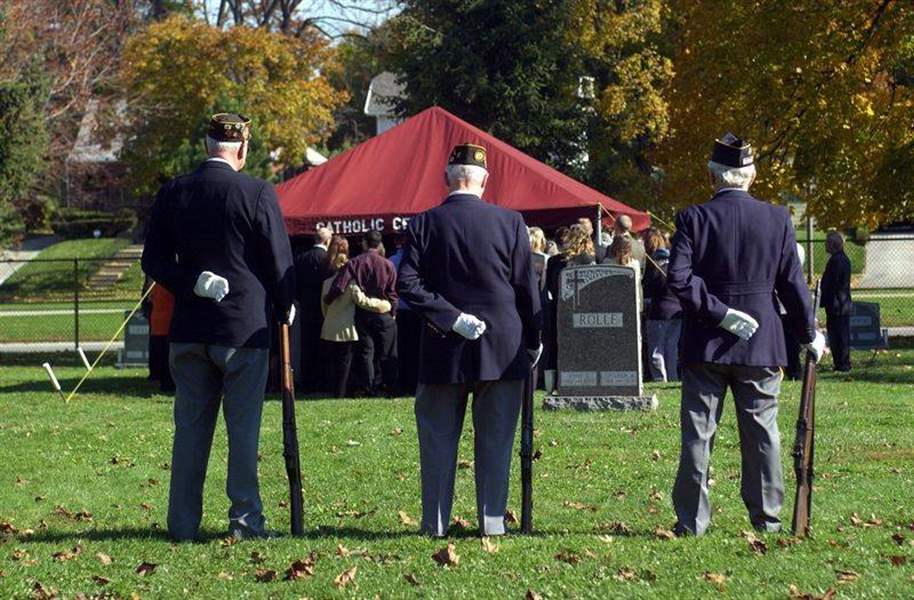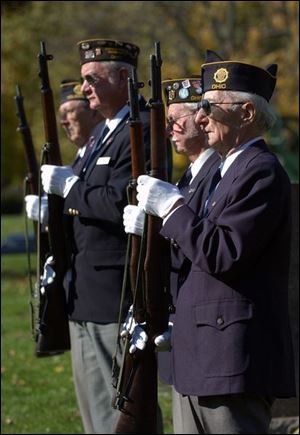
Dwindling ranks of honor guards pose problems for military funerals
11/11/2003
Members of the Lucas County Burial Corps stand at parade rest during Eileen Schaefer s funeral in Calvary Cemetery.
When U.S. Coast Guard veteran Eileen Schaefer died two weeks ago, five members of the American Legion and Veterans of Foreign Wars turned up at her Oct. 30 funeral to perform a military honors ceremony.
That s five fewer veterans than leaders of the Lucas County Burial Corps would have preferred. All things considered, however, it was a good turnout as military ceremonies go these days.
As the country celebrates another Veterans Day - its 77th - veterans organization officials say it is becoming more difficult to muster enough troops to turn up for the traditional military honors ceremonies at a dramatically increasing number of veterans funerals.
“We re losing so many veterans and the younger veterans are not joiners, so we re not getting replacements,” said Bob Mettler, executive director of the Lucas County Veterans Services Commission.
He noted that World War II veterans are dying at an average of about 1,000 a day, nationwide. Korean War veterans, many of whom are in their 70s, aren t far behind.
Although they are younger, a disproportionate number of Vietnam veterans are dying prematurely from illnesses related to everything from depression to exposure to Agent Orange, according to Vietnam service organization officials, further depleting the veterans pool.

Members of the Lucas County Burial Corps wait to perform a military salute during a funeral at Calvary Cemetary.
“The truth of it is, Vietnam vets are dying just as quick,” said Charles Kries, president of the Toledo Vietnam Veterans of America, Chapter 35.
According to Census Bureau figures, Ohio lost nearly 50,000 Korea veterans in the 1990s, about 8,000 of whom also fought in World War II. Northwest Ohio lost about 5,800 Korea veterans during that period, 800 of whom also fought in World War II.
Although a downsized military also has added to the decreasing number of veterans, other factors are at play. For instance, the country has about 850,000 Gulf War veterans, presumably enough to boost service club memberships and expand the honor guard pool.
It hasn t happened.
“There s been a very low amount of folks [from the Gulf War] signing up,” he said. “When they get home, the last thing they want to do is talk about the war. They want to get on with their lives.”
Patti Mook, of Groton, Conn., has a different viewpoint.
Her husband, John Mook, a retired U.S. Marine, is a member of the Disabled Veterans of America and the Veterans of Foreign Wars. But he works a 40-hour week and has little time to participate in veterans affairs.
“When he retires, he ll be ready to get involved,” she said.
Ms. Mook has seen first-hand the demands being placed on service organizations to keep up with an increasing number of veterans funerals.
As program manager of one of the Navy s regional military honors funeral support programs that includes Ohio and Michigan, she helps make sure every request for an honor guard presence is met. In 1998, Ms. Mook said 876 funerals were covered in her region. The number jumped to 2,614 in 2000 and 6,082 in 2002.
“It s the aging of World War II and Korean War vets,” she said of the increase in burials.
Each of the main military branches has a regional office that will dispatch a color guard upon request - if they can - often from a recruiting office.
Typically, a request for an honor guard begins at the funeral home, when a family informs the director that the deceased is a veteran. George Reeb, owner of Reeb Funeral Home in Sylvania, said some veterans have told their families they have no interest in any special military service.
“[They] have filled their obligation and prefer not to reflect on it anymore,” Mr. Reeb said.
When a deceased vet has belonged to a service organization, such as the American Legion or VFW, the funeral director contacts the organization to see what will be provided.
At one time, when the service organizations had full memberships, there was little problem turning out a traditional honors unit consisting of six riflemen, two color guards, a bugler, and a commander. That has changed. Membership has shrunk, and a number of posts have shut down.
Toledo American Legion Post 538 used to have more than 1,000 members. Today, it s down to 133 and most of them are seniors, said post commander William Tidwell.
As a result, the most the post usually can muster for a funeral service is several members, said Winston Bey, the post s finance officer.
Things are no better at the Vietnam Veterans Association Chapter 35 here, where membership has dropped from more than 400 to 106, according to Mr. Kries.
“We re having a hard time getting people to come to a meeting. [For military funerals], we really have a hard time,” he said.
It was the decline in service memberships that led to the formation of the Lucas County Burial Corps in 1996, the group that turned up at Mrs. Schaefer s funeral. The corps pools about 20 members from the American Legion and VFW to cover members funerals.
“We try to get eight at a time. Lately, we ve been averaging five,” said Gary Gilley, the corps commander.
One reason for the lower turnout is that Mr. Gilley s group was called on for 22 funerals during the first four weeks of last month, up from 12 in September.
“Last year, we did 140. That s about the norm for the last couple of years. I don t know if more families are taking advantage of the service or if more of them are dying,” he said.
With an average age of 72 to 73, Mr. Gilley worries the group may not last much longer.
“We re working on trying to recruit American Legion and VFW members from Vietnam and the Gulf War. The biggest problem is that they re not available during the day because they re still working,” he said.
But it s not always possible for even the military to keep up with the demand. So, increasingly, some funeral homes are taking on the role themselves.
“We always try to do whatever we can,” said Jordan Urbanski, owner of Urbanski Funeral Home at Lagrange and Dexter streets.
For Urbanski, that means draping the casket with a flag, playing a CD version of “Taps,” and presenting the colors to the family.
“The demand is very high, and being able to successfully arrange these veteran honor guards is getting more difficult. I don t know what other funeral homes are doing. I just know that the options are limited,” he said.